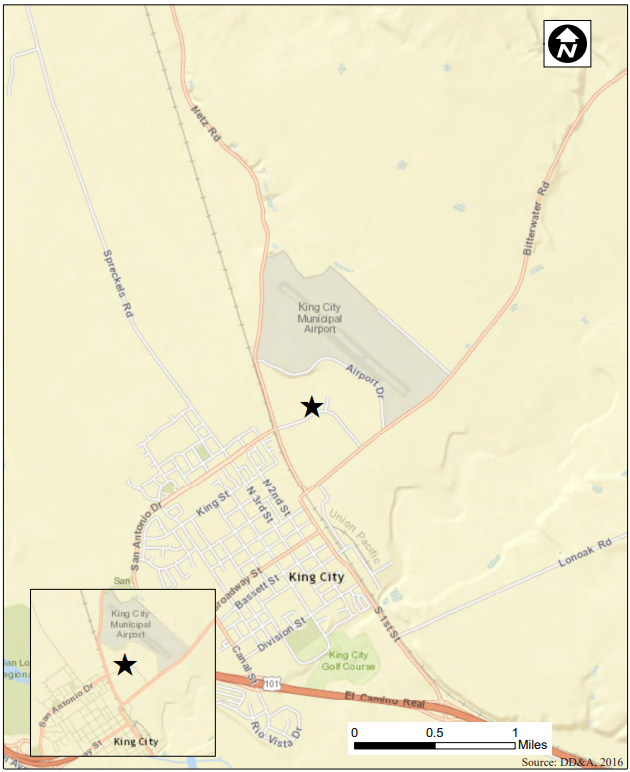
Caption: King City was determined to be the most centrally located and economically feasible option that had the fewest impacts on residential areas. It is also one mile from a planned multi-modal transit center.
Source: Credit to Monterey-Salinas Transit District (MST)
| Location | King City, California |
|---|---|
| Project Sponsor / Borrower | Monterey-Salinas Transit District (MST) |
| Program Areas |
|
| Value Capture Techniques | Special Assessment: Sales Tax Districts |
| Mode | Transit: Maintenance facility |
| Description | Monterey-Salinas Transit (MST) is a transit district that provides fixed route, demand-response, and special seasonal transit service to a 293.9-square mile area of Monterey County. It is designed to meet the unique needs of the rural, small, and medium sized communities it serves. MST operates 55 fixed routes in a service area made up of over 430,000 people and has a total of 73 standard diesel buses, six commuter coaches, seven diesel trolley style buses, one electric trolley style bus, 25 medium gasoline-powered buses, and four hybrid diesel-electric medium buses. As a part of its demand-response services, MST operates 41 medium gasoline-powered buses, including 34 for paratransit and seven for general public dial-a-ride service in the neighborhoods of Marina, Gonzales, Greenfield, Soledad, and King City. MST's transit services operate through two major transit hubs in Monterey and Salinas as well as secondary hubs in Marina and at the Edgewater Shopping Center in Sand City. The MST South County Operations and Maintenance Facility Project involves the development of a 4.8-acre, vacant parcel in King City, California, to construct an operations and maintenance facility for public transit vehicles that serve southern Monterey County. The project site is part of the existing industrial park site that King City approved in the East Ranch Business Park Specific Plan. Based on several factors, King City was determined to be the most centrally located and economically feasible option that had the fewest impacts on residential areas. Ultimately, the project site was selected because it has access to two public roads, allowing for alternate egress if one of the two roads is blocked by a natural disaster or vehicular accident. The site is flat and bounded to the west by a vacant lot, to the south by San Antonio Drive, to the north by the King City Energy Center, and to the east by Don Bates Way. The proposed project site is 340 feet above mean sea level, surrounded by industrial uses, and is heavily disturbed due to mowing and maintenance activities. The site is also one mile from a planned multi-modal transit center that will be served by MST buses and future passenger rail. There are no easements or right-of-way issues. The new 14,000 square-foot facility will house 40 buses of varying sizes and types, including vendor vehicles, which have been serviced offsite due to a lack of facilities on-site. The building will also include:
The southeast half of the building will include a 2,830 square-foot administrative area for office workstations, restrooms, break room, training room, storage, and a dispatch communication center. The drivers' facilities will include a drivers' lounge with adjacent day lockers, a quiet room, kitchen with vending machine area, and toilet rooms with showers. The northwest corner of the building will include an area for parts storage, mezzanine, steam cleaning, and other miscellaneous uses. The parking area will accommodate 45 employee vehicles and 40 buses. Electrical infrastructure will be designed to accommodate as many as four all-electric buses and several all-electric agency cars. The project is expected to accommodate future transit needs in the surrounding rural communities of Monterey's South County. Once complete, the facility will provide MST with a base in south Monterey County, which will reduce deadhead mileage, fuel usage, maintenance and labor costs, and the risk of breakdown. In addition, the project will also lead to modernizing the facility and equipment, reducing potable water usage relative to fleet size, increasing facility energy efficiency, and enhancing comfort and safety within the building and around the usable site areas. The 190 jobs generated by project construction is estimated to create $77.5 million in direct and induced economic return. |
| Cost | $17,240,000 |
| Funding Sources |
Project funding comes from the United States Department of Transportation Federal Transit Administration, State of California SB 1 funds, as well TAMC Measure X and local funding. |
| Project Delivery / Contract Method | Firm fixed-price, date-certain contract |
| Private Partner | Diede Construction, Inc. |
| Project Advisors / Consultants | To borrower:
To USDOT Build America Bureau:
|
| Lenders | USDOT |
| Duration / Status | Project construction began on July 10, 2020 and is planned for completion in Fall 2021. |
| Financial Status | On October 29, 2020, MST closed on a loan with USDOT for up to $8.45 million under the TIFIA Rural Project Initiative (RPI). The special loan features a no-fee, 35-year fixed interest rate equal to one half of the U.S. Treasury rate, or 0.78 percent. That will help finance the construction of a new South County Operations and Maintenance Facility in King City, California. The Transportation Agency for Monterey County (TAMC) will contribute $10.4 million in Measure X funds during construction and for loan repayment. The TIFIA loan repayment pledged will be from LTF taxes. The LTF Funds allocated to the Borrower and deposited into the Revenue Account |
| Innovations |
|
| Related Links / Articles |
|
| Contacts | Ikuyo Yoneda-Lopez |